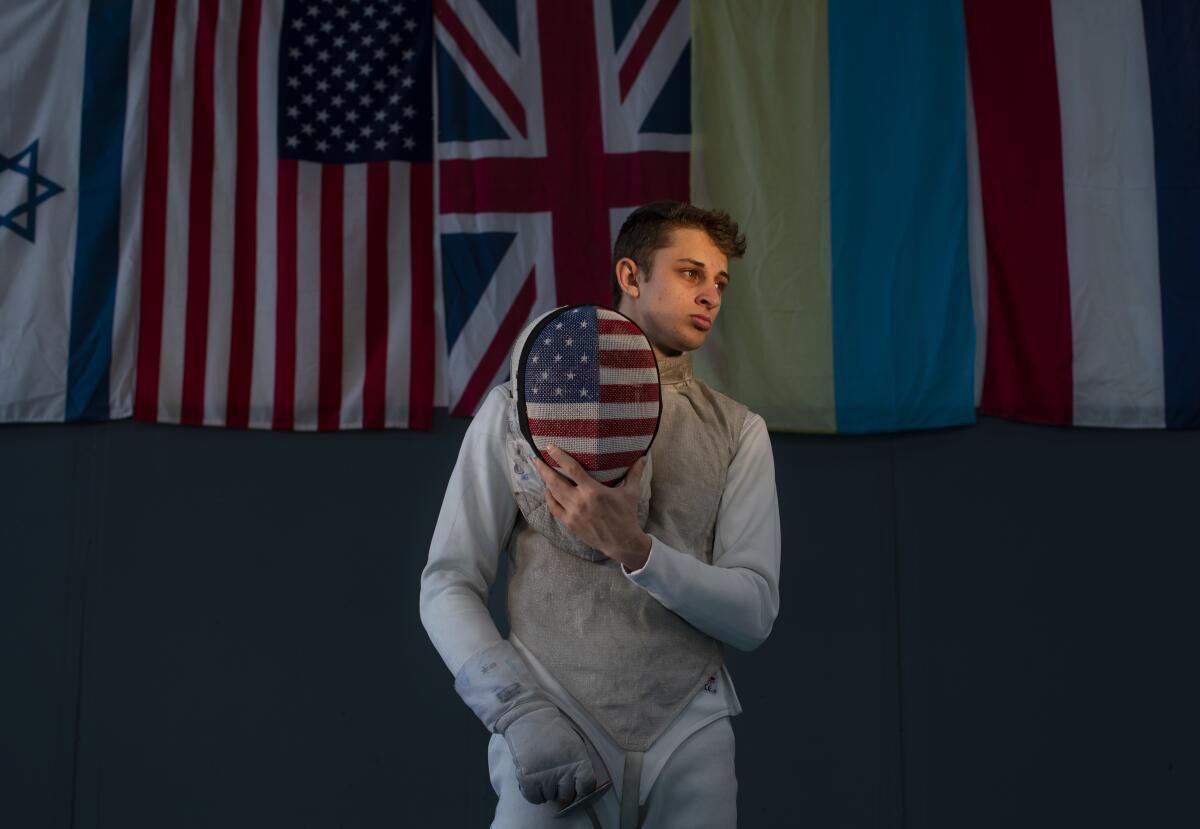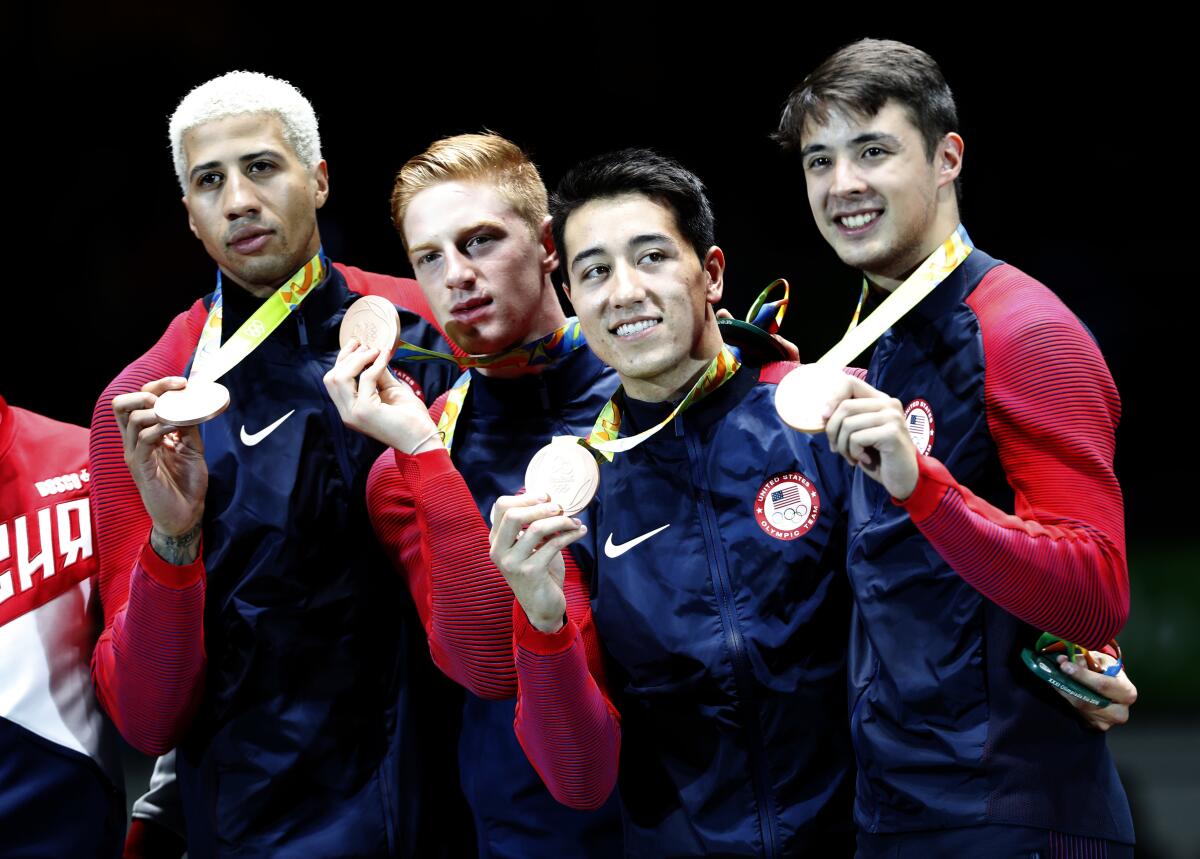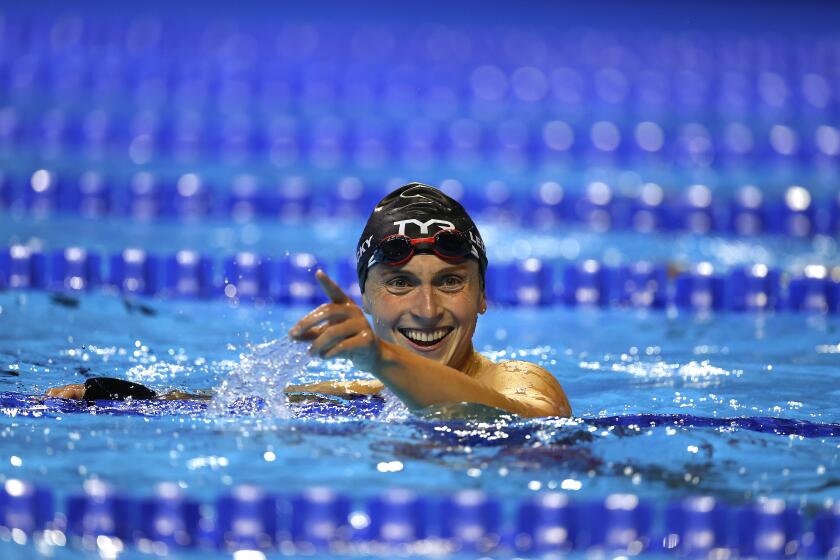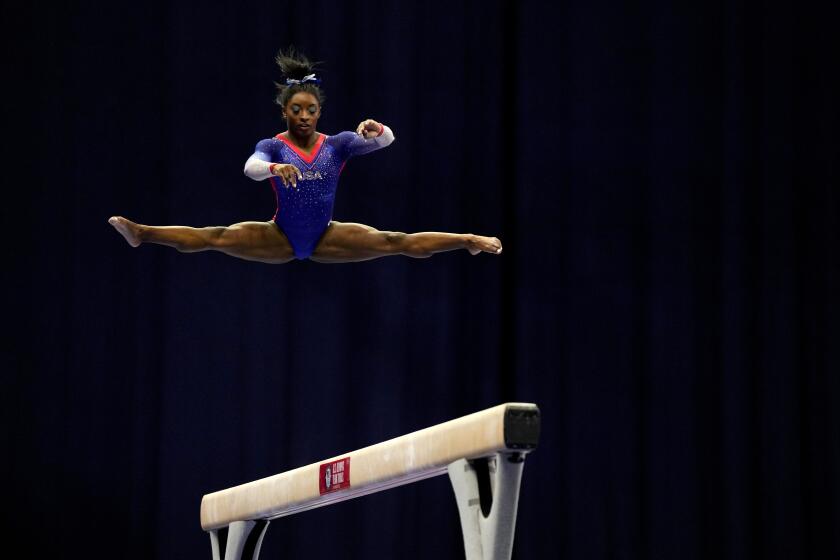SoCal phenom Nick Itkin could help Americans win first Olympic team fencing title

- Share via
Think of it as a waltz, feet scuffling, bodies shifting and ducking, fencers moving up and down the strip in unison.
Think of it as a conversation. When one fencer advances, the other retreats. Each feint elicits a response, maybe a defensive parry or a hop backward. Blades click against each other with the staccato beat of an argument.
In fencing, as with dance or debate, timing is everything. Fencers are looking for what they call “the moment” — the instant when their opponent relaxes or appears off-balance. That’s when to attack.
“The best fencers are physically strong but they’re a lot smarter as well,” Nick Itkin says. “That’s when the fencing becomes trickier.”
Katie Ledecky’s seemingly effortless excellence leaves some of the most experienced people in swimming grasping for the secret to her dominance
Itkin knows about good timing. The 21-year-old grew up at his dad’s fencing club on the Westside, learning the art of foil just as the U.S. was becoming a global force, rivaling the Italians, Russians and French in that discipline.
After consecutive NCAA titles at Notre Dame, he turned pro and hit a winning streak just in time to qualify for the Tokyo Olympics.
“He’s still very young but he’s technically solid,” U.S. foil coach Greg Massialas says. “His skills are all there.”
Subscribers get early access to this part of our Tokyo Olympics coverage
We’re offering L.A. Times subscribers first access to our preview of the 2021 games. Thank you for your support.
Competitive fencing comes in three varieties, each with slightly different blades, rules and strategies. Saber is all about clashing attacks while epee is more deliberate and tactical.
Foil ranks somewhere in the middle, a mix of strategy and explosive action, and that is where the U.S. excels. Four Americans — Gerek Meinhardt, Alex Massialas, Race Imboden and Itkin — rank in the world’s Top 10.
Itkin inherited his love of the sport from a father who emigrated from Ukraine and started the Los Angeles International Fencing Center in 2003. At the time, Misha Itkin was also coaching the U.S. national team.
Always around the club as a boy, Nick started foil at seven but did not start taking it seriously until a few years later.
“It was a really unique experience having your dad be your coach,” he says. “We talked about fencing at practice and then we went home for dinner and we’re still talking about it.”
L.A. ’28 is still seven years off, but the Olympic debut of surfing and skateboarding is turning the Tokyo Games into a SoCal showcase.
Nothing in his early years at the youth level suggested greatness; he often finished in the Top 8 but never seemed to win. That changed in 2015 with gold at a Budapest tournament. The following year brought victories in Italy, Poland and England.
“The mindset was different,” he says. “It wasn’t just to have a good result but to actually win.”
This success translated into an athletic scholarship at Notre Dame where he earned NCAA individual championships in 2018 and 2019.
“That was the big transition for him,” Greg Massialas says. “Notre Dame did a really good job to help him mature.”
In juniors and college, a fencer can excel with physical talents and a few types of attacks or “actions.” The senior circuit is different; pros study each other intently and can change strategies mid-bout, succeeding with a variety of styles.
Many of the top-ranked foilists are in their late 20s and early 30s so, like a lot of newcomers, Itkin faced a learning curve. Growing to 6-2 and a lanky 156 pounds, he gained a reputation for solid technique, the dependable footwork and precise blade movements required to compete at the top, but needed to overcome a tendency to rush.
Laguna Beach’s Nyjah Huston brings a fierce commitment to training to a rebellious sport, making the skateboarder a star to watch in the Tokyo Olympics
His ability to remain patient and analyze — to look for that moment — improved through a series of strong finishes. Then came gold at a 2020 World Cup tournament in Paris that solidified his spot as the youngest fencer in the Top 10.
“I had my bouts where I got destroyed and I lost bouts that I let slip away,” he says. “Still, I always had really high expectations for myself. This season, I knew I was close.”
The next step — making the Olympic team — required fighting through a logjam. As in many sports, the U.S. talent pool in foil is so deep that someone very good has to be left off the team. Of the five best Americans, only three qualify for the individual event in Tokyo; the fourth serves a replacement and can take part in team competition.
Gymnastics experts and those who have watched Simone Biles’ evolution explain how and why she became so much better than anyone else.
Itkin inched past two-time Olympian Miles Chamley-Watson last season, then grabbed the coveted third spot from Imboden, a three-time Olympian and bronze medalist.
“There are rules, there are guidelines and that’s how it is,” Imboden says. “But it’s difficult to be in a position where you feel like you have a shot to win an Olympic gold medal, but you don’t get to go for it.”
Massialas, the coach, says: “It’s a challenging situation, but it’s a nice problem to have.”
Now the U.S. foil team travels to the Games with a chance at history. Ranked No. 1 in the world four of the past five seasons, the Americans finished fourth at the 2012 London Olympics and took bronze at the 2016 Rio Games. If they can break through for gold this time, it will make them the first American team to win an Olympic title in team fencing.
While many countries have one or two strong fencers, and perhaps a weak link, the U.S. arrives with a solid roster top to bottom. If one fencer has an off day, the others can carry the team. That means the new guy is crucial.

Unlike the flamboyant Chamley-Watson or the stylish Imboden, who is also a fashion model, Itkin prefers to remain in the background. His coach says: “We try to get him to smile on the podium. We try to get him to talk but he won’t say a word.”
It helped when the Games were postponed for a year because of the coronavirus pandemic, giving Itkin some extra time to grow accustomed to his role as Olympian. Earlier this month, he tuned up with an individual gold medal at the U.S. national championships in Philadelphia.
For the quiet kid from the Westside, it seems that a first trip to the Games is all about timing.
“It was a dream and a plan that I always had,” he says. “I just didn’t expect it this soon.”
More to Read
Go beyond the scoreboard
Get the latest on L.A.'s teams in the daily Sports Report newsletter.
You may occasionally receive promotional content from the Los Angeles Times.











